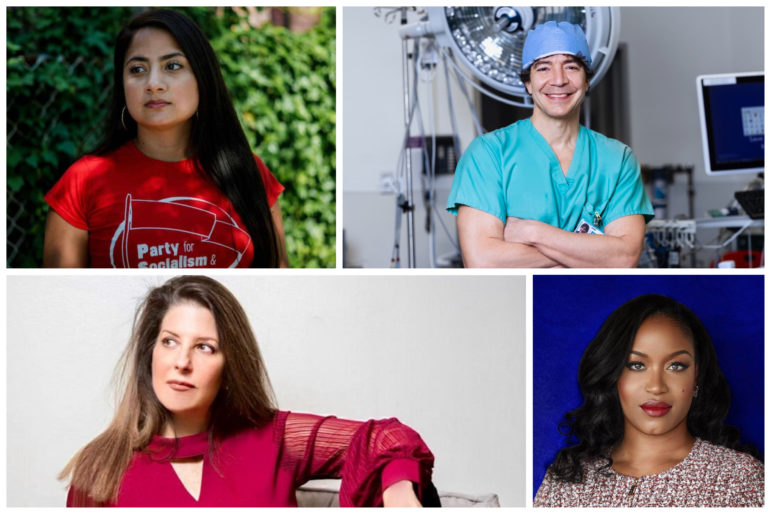Although Adams and Sliwa are billed as the leading candidates in the race, at least seven other New Yorkers have mounted campaigns for mayor. Some of these independent candidates said the official debates have been missing not only their voices, but a clear focus on some of the city’s most significant problems.

Courtesy of the candidates’ campaigns
From top left to bottom right: Cathy Rojas, Raja Flores, Quanda Francis, Stacey PrussmanThe final official New York City mayoral debate aired Tuesday night, an event that again pitted Republican hopeful Curtis Sliwa against Democrat Eric Adams, the current Brooklyn borough president.
Viewers of the previous mayoral debate, held last week, likely did not glean anything new about the two candidates or their positions from Tuesday’s standoff. Sliwa, founder of the Guardian Angels, again made the same case for his candidacy: He would represent a break from the de Blasio administration, one he has frequently disagreed with on subjects including policing and spending.
Adams, former police captain, played again to his experience in the NYPD and his working-class roots, stressing that he is the mayor the city needs to best recover from the COVID-19 crisis.
At points during the debate, which took place at WABC 7’s Manhattan studios, the two candidates sparred—loudly—over their positions on crime and violence, what to do with empty hotels, and the city’s vaccine mandate.
Although Adams and Sliwa were billed as the “leading contender” in the event, they are far from the only individuals competing for the city’s top job. At least seven other New Yorkers have mounted campaigns for mayor, according to the city Board of Elections. And while registered independents outnumber Republicans in New York City, none of these third-party candidates met the New York City Campaign Finance Board’s requirements to participate in the official debate. To take part in the first general election debate on Oct. 20, they needed to have raised and spent at least $182,150 (or 2.5 percent of the spending limit for mayoral candidates).
“City law establishes nonpartisan, objective thresholds to participate in the mandatory debates program,” CFB Spokesperson Matthew Sollars told City Limits. These low thresholds allow candidates to be heard and debate if they can demonstrate a minimum level of support, even if they fall short of the criteria to receive public funds.”
To qualify for Tuesday’s event—for which the debate’s sponsors could impose additional criteria—candidates needed to have raked in at least $250,000 in matchable contributions.
Some third-party candidates, in interviews with City Limits this week, said they feel the existing debate system rewards only those with extensive networks and expansive campaign coffers.
Without bringing in a lot of money, independent candidates cannot “actually become part of the conversation,” said Raja Flores, the thoracic surgeon at Mount Sinai who is running for mayor on the “Humanity United” line.
“That’s been the most disappointing, to see money used as a surrogate for credibility,” he added, just before an emergency summoned him to the operating room.
Other independent candidates on the ballot agreed, saying the official debates have been missing not only their voices, but a clear focus on some of the most significant problems facing New Yorkers, including COVID-19 recovery, the ongoing crises facing NYCHA, homelessness, and lagging performance in the city public school system.
“I think New York needs to vote differently,” said comedian and Libertarian candidate Stacey Prussman, a Brooklyn resident whose campaign calls for prioritizing mental health care and reducing city spending. “Everyone wants change, and difference, but you keep doing the same things, you get the same results.”
In addition to Flores and Prussman, these independents are also on the ballot:
- Quanda Francis, a Brooklyn-based data scientist, is running on the “Empowerment” line. The centerpiece of her platform is redesigning K-12 education and leveraging emerging technology to prepare students to “take advantage of a 21st Century economy as entrepreneurs instead of as consumers.”
- Fernando Mateo, the businessman who initially sought the Republican Party’s nomination before losing out to Sliwa in the June primary, is listed as running on the Save Our City line on the general election ballot, though his campaign website suggests he has exited the race. “It was an amazing run and I wish the best to the remaining candidates,” Mateo wrote. “New York City needs a revamp and we are all rooting for a mayor that will bring that to our beloved city. God bless.”
- Conservative Party candidate and former NYPD police officer William Pepitone did not respond to a City Limits request for an interview. Pepitone, of Staten Island, said on his Facebook page last June that he decided to run because he “realized I could no longer sit idly by and watch the intentional destruction of the greatest city in the world, and the dismantling of its greatest police department.” If elected, “he also promised to undo a recent package of police reforms,” according to the Daily News. “Those include a ban on chokeholds; the ‘POST’ Act, which requires the NYPD to disclose its use of surveillance technology; and creation of a ‘disciplinary matrix’ aimed at creating uniform punishment for cop infractions.”
- Socialist Cathy Rojas of Queens has mounted an ambitious progressive campaign that calls for “a system of governance that is rooted in the interests of working class people,” she told City Limits. She’s proposed a “rent-controlled city,” where landlords would be barred from charging rents that are more than 20 percent of a tenant’s income.
- Skiboky Skora, running on the Out Lawbreaker line, is a formerly homeless New Yorker who said he was shot three times in a city shelter. Skora, who could not be immediately reached for comment, describes himself as “a member of the Movement of Freedom aka The Donald Trump Movement,” on his website. “This is a movement for the American people to run their country not the American government,” the page adds, cryptically.
Though they have been excluded from the debate stage, the third-party candidates who spoke with City Limits offered their big ideas for the city’s big problems.
On the biggest issues the city is facing, and what deserved more focus at the official debates:
Flores: “The main thing that I’d love to see on the debate stage, more than anything else, is how are they going to fix public housing in New York—NYCHA, that is the most important thing.
“When I was knee deep in COVID, the people who were coming to work [at Mount Sinai] every day were the people who lived in NYCHA, the people who were most at risk from COVID,” he said. “Transporters, nurses, nurse’s aides, technicians, these are the people that kept our city going.”
Seeing firsthand how living in the city’s troubled public housing system, which is managed by the federal government, affects his patients’ health made this priority a no-brainer, Flores said.
“Housing affects everything,” Flores, who grew up in Manhattan’s Meatpacking District, added. “If I didn’t grow up with affordable housing, where we paid $200 a month, my mom couldn’t buy books for my education to become a doctor. Housing’s not just a big part of it—it’s everything.”
Francis: “We are not preparing our students for a 21st Century economy,” Francis, who has an 11-year-old son, said. The centerpiece of her platform is redesigning K-12 education and leveraging emerging technology, like artificial intelligence and machine learning, to prepare students for fields that are expected to grow in the next 10 or 15 years.
“My concern is that if we don’t elect individuals that will focus on modernizing education, and rethinking education policy,” Francis added, “we’re not going to be competitive.”
Prussman: “How about getting to the real issues, like the mental health issues, addiction, housing insecurity, and food insecurity?” Prussman asked, outlining some of the problems she is most focused on.
“Those are huge things that the city is going to face that need to be addressed,” she added. Crime, which has earned a lot of airtime during the debates, “is only a product of those things,” Prussman said, calling for “inventive” solutions to mental health care needs.
“I lived through 9/11,” she added. “We were changed that one horrific day. We’ve been in this [pandemic] for almost two years. We are changed from this. We have to accept that we are not going back. And that’s not a bad thing, but we’re going to move forward very differently.”
Rojas: “This election is a matter of life or death,” said Rojas, whose platform includes increasing taxes on the rich and defunding the police department to create funding for health care, affordable housing, improvements to public education, and free transit.
Rojas, a teacher who lived in Elmhurst, Queens, during the earliest days of the COVID-19 pandemic, said the crisis helped prompt her campaign.
“COVID wasn’t necessarily what was killing our families,” she added. “What was killing our families was years of closing down hospitals, was years of not having adequate access to housing and housing discrimination.”
Election Day is next week, Nov. 2.










One thought on “Who Else is Running for NYC Mayor? Hear From the Candidates the Debates Left Out”
adams is a rep hiding in dems clothes same as worst mayor ever did mikee moneybags in 2002
catman curtis is great for defending animals and fighting crime
for free for decades but is linked to rotten phony hero ghouliani
our votes go for Rojas….